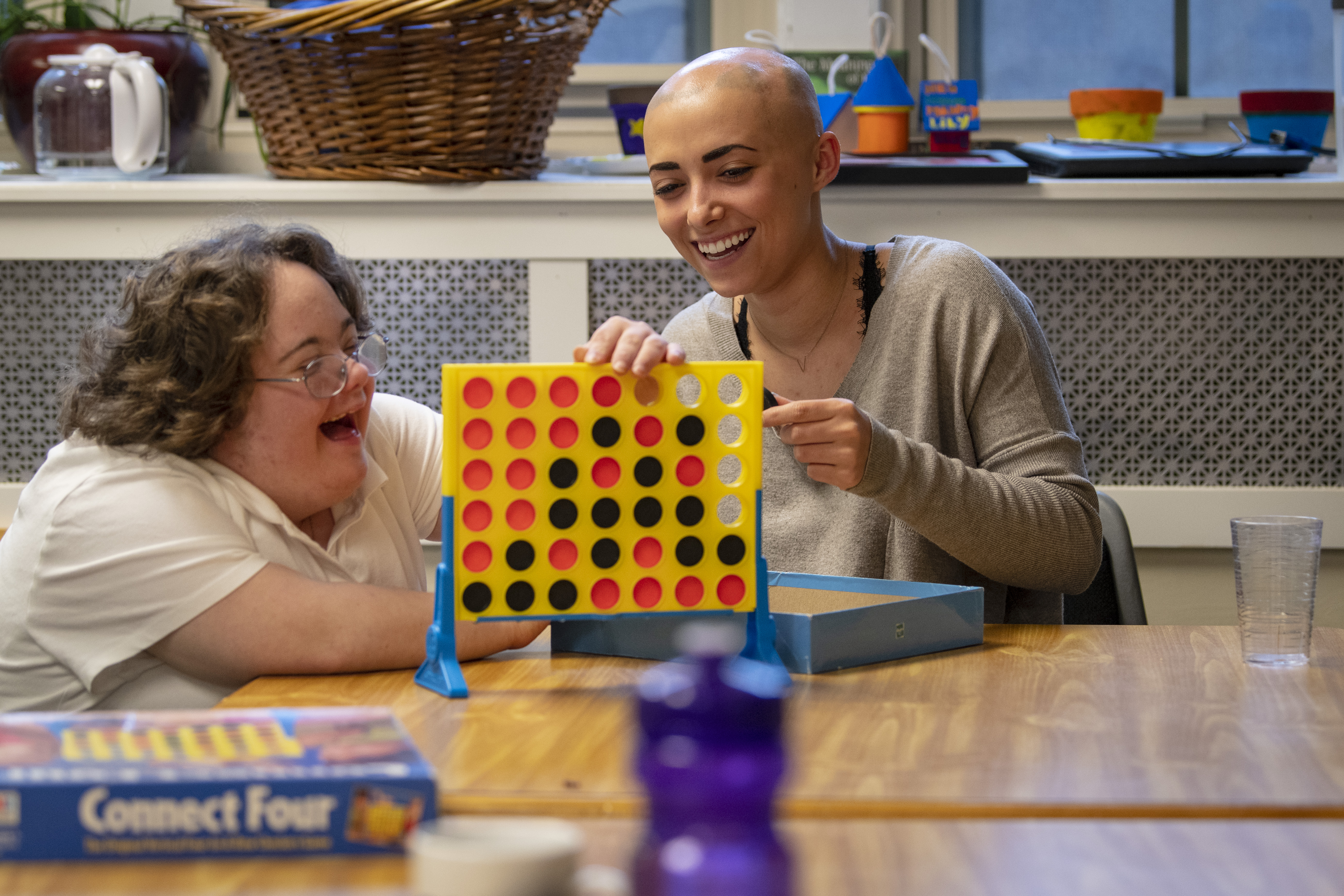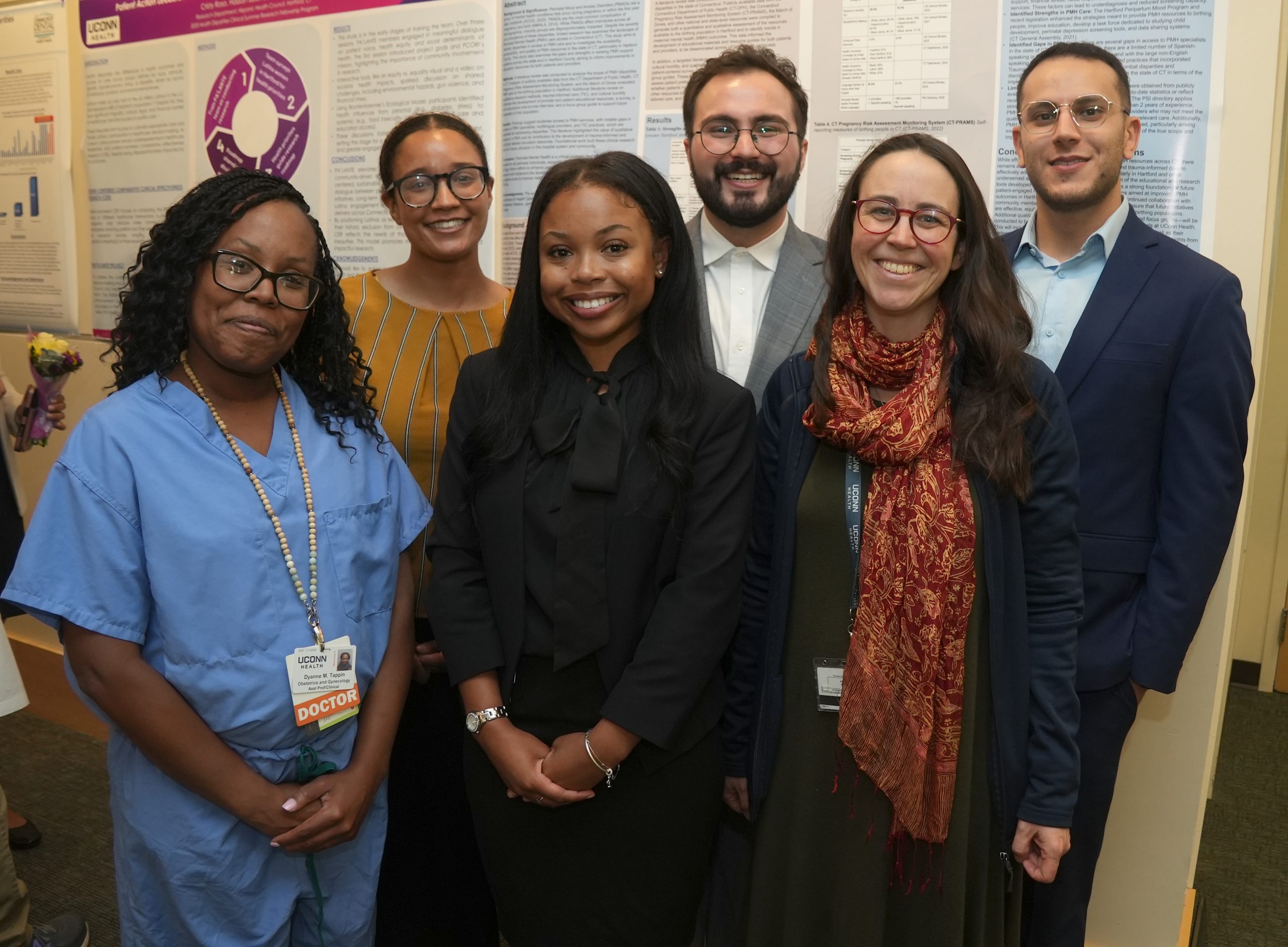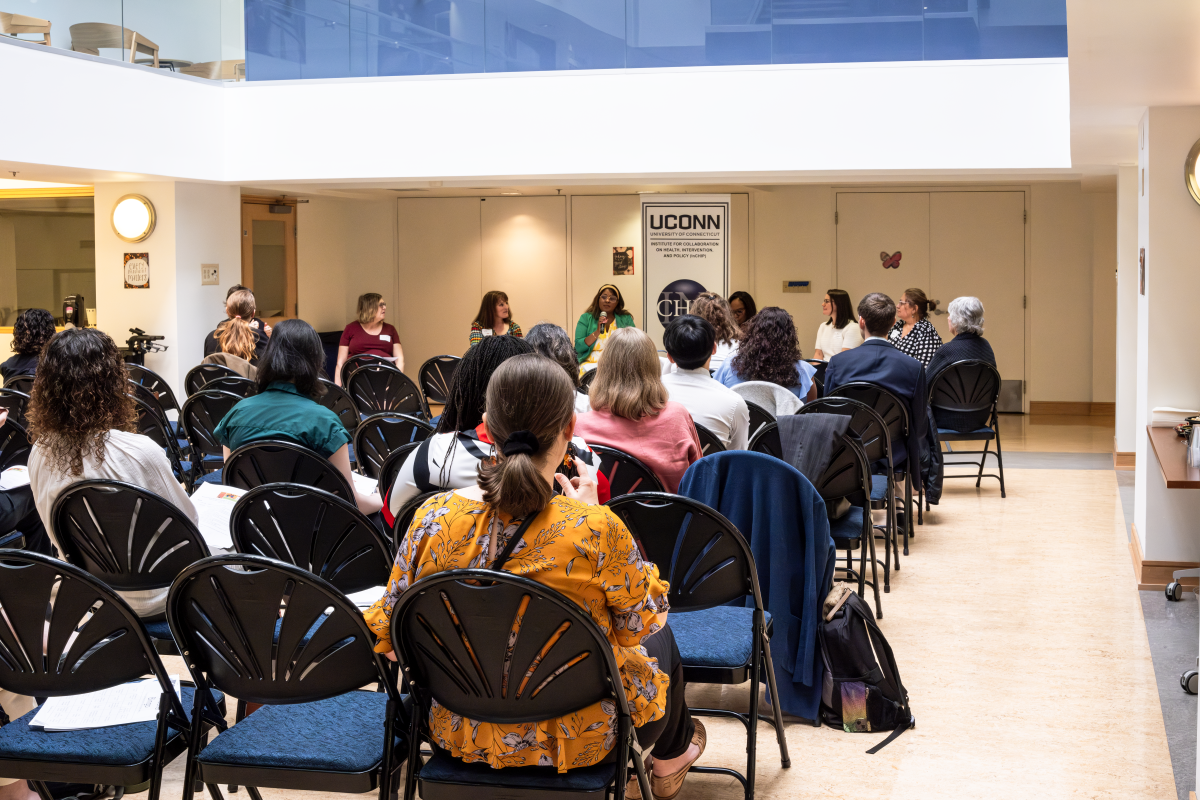A set of unassuming and unlabeled white double doors open into the basement of Sprague Residence Hall. Just beyond the foyer, which is stacked with folded and packaged linens, are rows of stainless steel laundry washing and drying machines, slowly tumbling and turning, making the air comfortably warm and thick with the scent of detergent and fabric softeners.
But most students who make their way to this part of Sprague Hall aren’t here for the laundry service. They instead walk beyond the folding tables and the storage closets, down a twisting hallway, to a set of classrooms that are full of a completely different kind of warmth and that are unlike any others on the Storrs campus.
The walls of the classrooms beneath Sprague Hall are covered with posters and photographs that testify to the activities and accomplishments of the students that meet there – participants in the Students Transitioning to Age-appropriate Routes program, a class better known as S.T.A.A.R., which represents a unique partnership between UConn and Connecticut’s Regional School District 19.
S.T.A.A.R. is a transitional program for students ages 18 to 21 that is designed to help young adults living with developmental disabilities continue their learning, develop vocational and independent living skills, and enhance their social relationships in a college-based setting.
The program began with one student in 2005 and now includes an average of 20 students each year, all of whom have previously completed four years of high school either at E.O. Smith High School in Storrs or at a high school from another area town. S.T.A.A.R.’s integration with the University’s campus – and with UConn students – is part of the program’s appeal for prospective students and their families.
“There’s such a pride when our students from the high school say they’re coming to the UConn S.T.A.A.R. program,” says Christine Gomes, S.T.A.A.R.’s program coordinator. “A lot of times, families will buy Husky t-shirts and accessories for them. We know this isn’t a backdoor into the traditional University and they’re not going to leave here with degrees. But they’re going to leave here with the Husky experience and the experience of their peer mentors, with the way their lives will be enriched, they can always – like all of us – reflect back on these years of their life.”
In addition to its physical location on UConn’s Storrs campus, S.T.A.A.R. partners with UConn organizations and area businesses to provide volunteer and vocational experiences to students who are able to work. S.T.A.A.R. students work in the Floriculture greenhouse and at the Storrs Agricultural Experimentation Station on campus, at the local Big Y and Price Chopper supermarkets, and at nearby Windham Hospital, through partnerships with the program.
The program also partners with student groups and faculty members to provide peer mentorship opportunities where UConn students interact with S.T.A.A.R. students, either as part of their college coursework or through student groups and clubs.
“A lot of the students we work with have not had traditional opportunities to go to birthday parties, go to sleepovers, go out to movies with their friends on the weekend,” says S.T.A.A.R. co-director Heidi Zabilansky ’95 MA. “So when they come here, they form some nice relationships amongst themselves, but it’s really nice when they get to go and spend time with their peers.”
“During time away from work or our communal outings, students may be playing a game, such as a life skills game, or practicing conversational etiquette, or they may be going to get a coffee and lunch,” says Gomes. “Things that are taken for granted by a typical UConn student, our students just really get excited about. Their enthusiasm could stem from something as simple as a walk to the student union, or swiping a card at the dining hall.”
Students from UConn Best Buddies, the University’s chapter of the international nonprofit organization that fosters one-to-one friendships between volunteers and people with intellectual and developmental disabilities, regularly visit the class, as do students from UConn’s Unified Theater – a national program that works to dissolve barriers between youth through school-based performing arts programming.
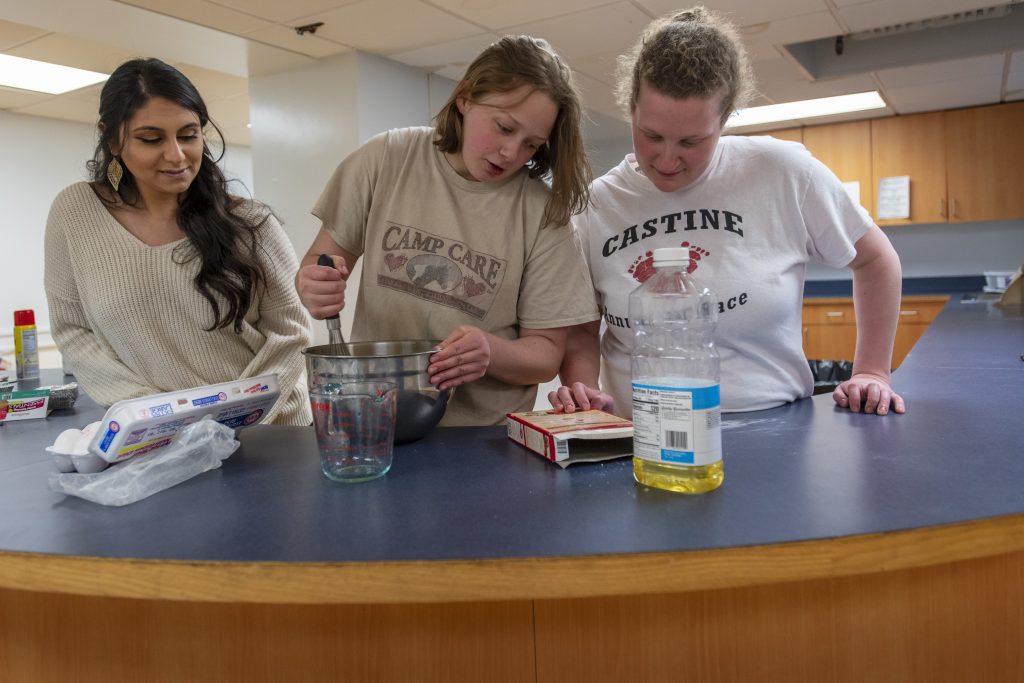
Rachel Nadell ’20 (CLAS), a human development and family studies major, is the current president of UConn’s Unified Theater chapter. The club’s students have visited S.T.A.A.R.’s classroom weekly this semester, where they play theater games, do improv and other icebreaker activities, and organize and produce an original theater production with S.T.A.A.R. students. Nadell says the games they play are, to her, the most enjoyable part of Unified Theater.
“Everybody kind of lets loose a little bit,” she said. “Everybody lets their guard down from their regular day of classes, for both UConn students and the S.T.A.A.R. students. Things always get kind of crazy, and things are always silly, and everybody’s always laughing the whole time. I think that the games are the things that really help us to befriend each other the most and get to know each other the most.”
The class has also partnered with faculty members to work with students enrolled in certain classes or programs. Each semester, two-to-four UConn physical therapy students meet with S.T.A.A.R. students at the Mansfield Community Center, where they exercise and do other physical activities at least once a week.
The S.T.A.A.R. program’s biggest faculty “cheerleader,” according to Gomes, is Inge-Marie Eigsti, an associate professor in the Department of Psychological Sciences. Eigsti researches autism spectrum disorders (ASD), and she teaches a one-semester, biennial, advanced undergraduate seminar on autism and other developmental disorders – a requirement of which is that her students interact and work with students in the S.T.A.A.R. class.
“To really understand the diagnosis [of an autism spectrum disorder], it helps a lot if people learn about it not just by reading journal articles about the diagnosis, but by really meeting people who have that diagnosis,” Eigsti says.
She says there is “high value” for members of the UConn community – even those not studying psychology or developmental disorders – in partnering with S.T.A.A.R.’s teachers and students.
“We benefit just as much from this interaction and the opportunity to have this experience as the S.T.A.A.R. students do,” says Eigsti. “We have students that are pre-med, or are going into other kinds of careers that might not be focused on developmental disabilities, but boy, you sure do want a physician to understand what the signals of ASD might be.”
Physiology and neurobiology student Aditi Sirsikar ’22 (CLAS) had spent time with students with developmental disabilities as part of a high school club and an internship, and her interest in researching autism – and the opportunity to partner with the S.T.A.A.R. program – drew her to enroll in Eigsti’s class even though she’s only in her freshman year at UConn. She’s done crafts or played games, like the card game Uno, with her S.T.A.A.R. partner, but also helped him one day while he was searching for potential jobs near his home.
“I think you can study autism, and that’s nice, but you actually have to meet people with autism to understand,” says Sirsikar, who hopes to research screening methods for depression in people with autism. “Every single person has a different experience, and I think that’s so important. Each person is so unique and the more people you talk to, the better idea you have of the condition, and some of the challenges and some of the joys associated with autism.”
Unlike Sirsikar, Jillian Wilson ’20 (CLAS), a psychology student, didn’t know about the S.T.A.A.R. class before enrolling in Eigsti’s seminar, but she wanted to learn more about developmental disorders and wants to become a school psychologist. She and her S.T.A.A.R. partner text each other on days when Wilson can’t visit the class, and they visit UConn’s horse barns, ride the buses around campus, or play games in the classroom on days when she can.
“Starting out, I was a little nervous, because I’ve never really done anything like this,” says Wilson. “But that was only really the first time, now it’s totally second nature. They’re so nice over there, and they love when we come. They just get so excited, not only our peer partners but everybody in the classroom. It’s very rewarding.”
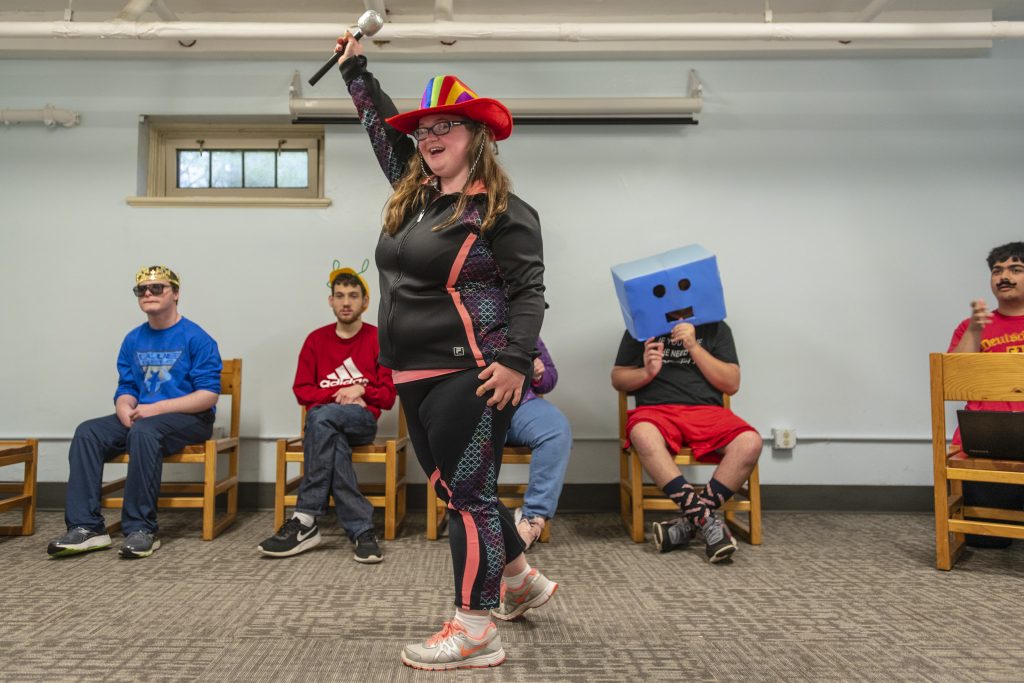
Nadell and her vice president in Unified Theater, Alex Gutierrez ’20 (ED), ’21 MA – a Spanish education major in the five-year integrated bachelor’s/master’s teacher education program who was involved in drama clubs and Unified Theater in high school as well – say that they both learned about Unified Theater in the Daily Digest email when the club was just starting out.
“I have been with some of the same people for three years, and they’re graduating this spring,” Nadell said.
“I don’t want to think about it,” quipped Gutierrez.
“We’re getting upset because it’s just crazy how I really feel like I’ve made friends, and I feel like I’ve made really good connections with people who I wouldn’t have had the opportunity to make a connection with before, without this club,” says Nadell. “I’m thankful to the S.T.A.A.R. program for letting us be a part of their classroom. I think it’s really awesome that they trust us enough to be a part of their weekly schedule.”
Nadell and Gutierrez encourage other UConn students who might be interested to join Unified Theater, or another group, like Best Buddies, if theater doesn’t interest them.
Sirsikar advises other UConn students considering a club or partnership with S.T.A.A.R. to be open-minded.
“Each person in the S.T.A.A.R. classroom is very different,” she says. “Some people are non-verbal, some people are working to live independently in a couple of years, and those are two very different and distinct groups. Just going in and wanting to have a good time and to brighten someone’s day, it can be really fulfilling, and just embracing the opportunity is really important.”
For their part, program administrators Gomes and Zabilansky say the S.T.A.A.R. program is always looking for opportunities to expand, and they’re open to creative ideas about vocational, cultural, or community partnerships with UConn faculty, departments, and organizations.
“There’s a lot of good young people who are making their way down to the basement of Sprague Hall to make a difference that often goes unseen outside of our program,” says Gomes. “The act of taking the time to care is incorporated into their day. That is why we are truly grateful to be in this partnership, and we continue to be excited about all the possibilities.”
For more information about the S.T.A.A.R. class, or to connect with program staff about partnership opportunities, visit staarprogram.weebly.com.
To learn more about UConn’s Unified Theater club, email unifiedtheateruconn@gmail.com.
